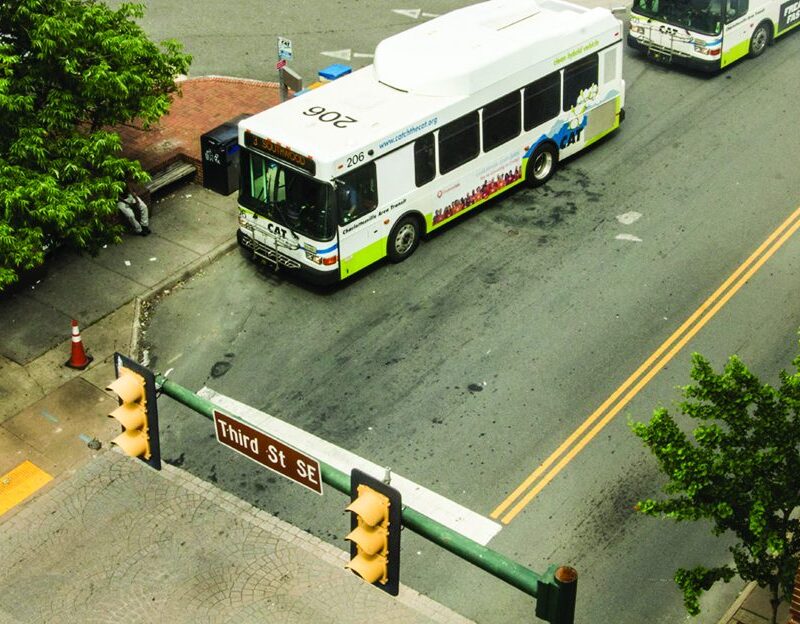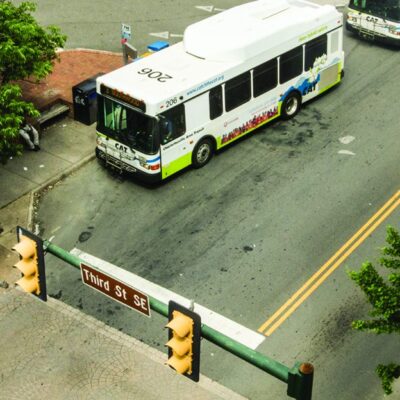|
River Bend Vice President Alan Taylor is excited to develop the land between Fifth and Avon streets into a shopping center featuring Wegmans, a high-end grocery store with devoted followers. (Photo by John Robinson) |
Turns out the rumors are true—Wegmans is coming to town. River Bend Management, a local developer owned by Coran Capshaw, announced last week that the high-end, New York-based grocery store will be the anchor tenant of the new shopping center on Fifth Street.
Charlottesville resident Megan Morrison was one of many whose eyes lit up at the mention of the upscale grocer, which has cultivated a cult-like following in eastern suburbs. Morrison, who is new to town, said that she loves Wegmans and may continue renting her current apartment longer than originally planned, just to be close to the store—which, according to River Bend vice president Alan Taylor, isn’t likely to arrive for another three years.
Taylor estimated that the project, including the new Bent Creek Parkway, the road connecting Fifth and Avon just outside the city limits, will be completed by summer 2015, but the developers are still discussing specifics with the county.
In 2008, the Albemarle County Board of Supervisors approved the rezoning of the area between Fifth and Avon streets from light industrial to planned development shopping center. But now that an anchor tenant has been solidified, the developers and the county are negotiating some of the original proffers and the layout before the project can move forward.
When the original proposal went in front of the county in 2008, River Bend included a number of details to make the project environmentally and aesthetically pleasing, promising funds for things like greenway trails, tree conservation areas, and Moores Creek erosion buffers.
Taylor said certain aspects of the original plan may not be appealing to tenants. A proposed roundabout could be a challenge for delivery trucks, he said, and some retailers are opposed to green roofs, concerned that retained water could damage property and electronics.
“[River Bend] agreed to a few things that may not make the project economically feasible now,” said County Supervisor Chris Dumler, who represents the district that will include the shopping center. He said proposed changes include eliminating the roundabout and green roofs, modifying the storm water management plan, and negotiating the amount of commercial real estate tax dedicated to transit funding.
Dumler acknowledged that the county’s neighborhood model could complicate the process of attaining tenants for the shopping center. He said Albemarle requires developers to establish a concrete, specific layout for shopping centers, with exact square footage for retailers and parking. This is necessary, he said, because the county wants developments to look a certain way, but it can be a challenge to find tenants to fit such exact specifications. Twenty years ago, he said, developers could provide a more general plan and make adjustments based on retailers, but the county has “clamped down” over the years.
“There’s got to be some healthy medium,” Dumler said. River Bend and county staff are still negotiating the plans, and Dumler said he doesn’t know how long it will take to come to a conclusion.
When both sides are satisfied, the new application will go in front of the Planning Commission this summer, and to the Board of Supervisors for a final vote in August or September.
After the Board’s final vote, River Bend can break ground and get approval from Virginia Department of Transportation to design and build the promised Bent Creek Parkway.
“We knew building this connector road was very important to the county,” Taylor said. The road, which will run along the northern perimeter of the new shopping center, is expected to alleviate traffic congestion in the area and improve fire and rescue response times.
Taylor said the parkway will be constructed simultaneously with the shopping center. It is a vital component of the project, he said, but part of the site itself is currently filled with years’ worth of trash.
In addition to the 60 acres of land for the shopping center, River Bend also purchased the 20 acres that are home to the old Charlottesville Municipal Landfill, and plans to build a “floating road” over the landfill.
According to Taylor, the parkway must meet certain compaction standards, but building over a landfill “is kind of like building over a sponge.” To meet the compaction standards, the construction process will be similar to building a bridge. Geotextiles, which can increase a road’s lifespan by evenly distributing loads and preventing cracks, ruts, and potholes, will be put down before the road itself is built. It’s a pricy, high-tech fix, Taylor admitted, but is part of the cost of acquiring prime real estate.
It’s difficult—there’s no way around it,” he said. “But this [landfill] is a problem that everybody in the area made, and we’re taking it upon ourselves to fix it.”
/alan_taylor.jpg)





